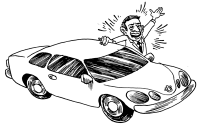The Ethan Allen Highway, known on maps as Route 7, which starts in Canada, fifty miles below Québec, at the confluence of Hudson Bay and the St. Lawrence Seaway, wanders south in the distracted way you might wander south if you were a bird or an old person in search of boardwalks and palm trees for winter. It goes through five states, runs by rivers and lakes, over mountains, and alongside points of historical interest; becomes, as if desirous of another life, the main street of several picturesque New England towns, including Burlington, Vermont; Pittsfield, Massachusetts; and New Milford, Connecticut, before ending at the on-ramp of Interstate 95, which lifts up the remainder of its traffic and hurries it south in a more direct and brutal way. Route 7 is, in other words, one of the old roads of America, a trail first broadened for horses, and, before that—and if I say probably it’s because I don’t really know—worn by Indians, most on foot, most of these feet in moccasins. It’s instructive to study how such a road begins, which (in this case) is in the wilderness of Champlain, and how such a road ends, which (in this case) is in the knot of car dealerships at the bottom of 7, as, in its journey from north to south and then to now, Route 7 re-creates the journey of the nation. What began in wilderness culminates in showrooms. What began in Indians culminates in salesmen. The car itself, the platonic idea of the car, is really a concrete expression of all that road, its products as well as its creator. We have the roads because we have the cars; we need the cars because we have the roads. (Even in repose, a car implies the freedom of the open road.) It’s impossible to imagine modern American life without the car—fast car, muscle car, roadster, pickup, minivan—just as it’s impossible to imagine the life of the car without imagining the car salesman, sprightly, statistic-spouting go-getter or tired polyester hack, in his fishbowl at the bottom of Route 7.
When I decided to write a story about the salesmen of cars, used and new, it was because I believed the car salesman to be a preacher in the church of the American dream. What is a car salesman if not a cleric who, like a minister or rabbi, sells the vision and moves the product? I believed such a story would be funny, as I would cram it with all the dealership stories I have accumulated in my life of buying and selling and being angry about cars. But as I went along, visiting dealerships, reading articles and books, then watching congressional...
You have reached your article limit
Sign up for a digital subscription and continue reading all new issues, plus our entire archives, for just $1.50/month.
Already a subscriber? Sign in





